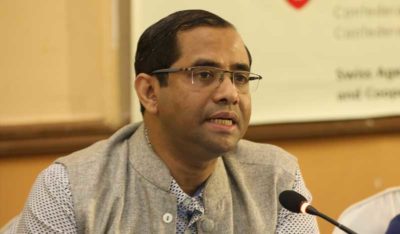Published in The Daily Star on Monday 13 April 2020
 The World Bank has made a dire projection about economic growth. And arresting the downturn in economic growth hangs on how fast the government responds with effective measures to address the Covid-19-induced health and economic emergency. Weakness in tackling the massive health risk will worsen the economic crisis. The ongoing shutdown has hit wide spectrum of the economy from exports, remittance, domestic economic activities to jobs and income, thus increasing the risk of worsening poverty. Some efforts to mitigate the negative impact on the economy are seen in the government’s declared measures. But the big challenge is to ensure finances from banks as much as needed. Recovery and arresting the downfall will also depend on the types of steps the government takes to bail out millions of micro and small businesses in the informal sector. The risk of many people becoming poor is very high in the informal sector. More than 98 per cent of 78.18 lakh economic units represent cottage, micro and small-scale enterprises. And 80 per cent of workers in these firms are involved mostly on a full-time basis but largely without proper contracts. About 90 per cent of the firms have no VAT registration and are likely to be out of commercial banking facilities. Hence, these enterprises would find it difficult to get support under the bank-based revolving fund facility. The government may consider a third bailout package for informal sector enterprises along with other affected groups such as farmers to ensure cash flow. The government can also consider giving food and cash support to people in distress in urban areas.
The World Bank has made a dire projection about economic growth. And arresting the downturn in economic growth hangs on how fast the government responds with effective measures to address the Covid-19-induced health and economic emergency. Weakness in tackling the massive health risk will worsen the economic crisis. The ongoing shutdown has hit wide spectrum of the economy from exports, remittance, domestic economic activities to jobs and income, thus increasing the risk of worsening poverty. Some efforts to mitigate the negative impact on the economy are seen in the government’s declared measures. But the big challenge is to ensure finances from banks as much as needed. Recovery and arresting the downfall will also depend on the types of steps the government takes to bail out millions of micro and small businesses in the informal sector. The risk of many people becoming poor is very high in the informal sector. More than 98 per cent of 78.18 lakh economic units represent cottage, micro and small-scale enterprises. And 80 per cent of workers in these firms are involved mostly on a full-time basis but largely without proper contracts. About 90 per cent of the firms have no VAT registration and are likely to be out of commercial banking facilities. Hence, these enterprises would find it difficult to get support under the bank-based revolving fund facility. The government may consider a third bailout package for informal sector enterprises along with other affected groups such as farmers to ensure cash flow. The government can also consider giving food and cash support to people in distress in urban areas.
Khondaker Golam Moazzem, Research director of Centre for Policy Dialogue


